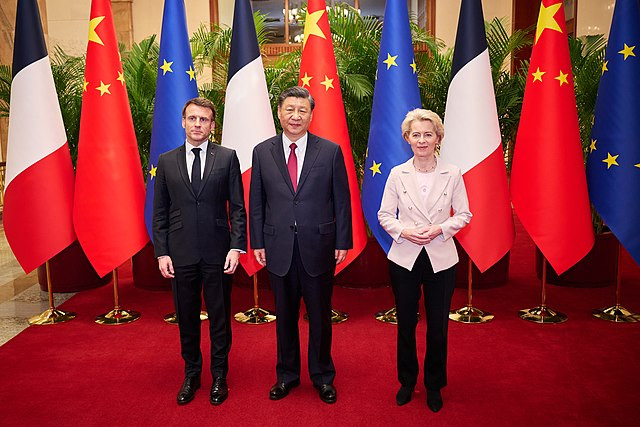China issued a strong rebuke to NATO on Thursday, accusing the alliance of fostering security at the expense of others and warning against bringing "chaos" to Asia. This fierce response followed NATO's recent designation of China as a "decisive enabler" of Russia's war against Ukraine. The statement from China's Foreign Ministry highlights the growing tension between the Western military alliance and Beijing, as the latter rejects any role in escalating the conflict in Ukraine and opposes NATO's strengthening ties with Asian nations.
"NATO hyping up China's responsibility on the Ukraine issue is unreasonable and has sinister motives," stated Foreign Ministry spokesperson Lin Jian during a daily briefing. He emphasized China's stance as fair and objective regarding the Ukraine crisis, a position that has seen China refuse to condemn Russia's invasion or label it an act of aggression.
NATO, in a declaration issued during a summit in Washington, accused China of enabling the war through its "no-limits partnership" with Russia and significant support for Russia's defense sector. Lin countered these claims, arguing that China's trade with Russia is legitimate, reasonable, and compliant with World Trade Organization rules. He further criticized NATO for seeking security that compromises the security of other nations, echoing Russia's sentiment that NATO's expansion poses a threat.
Amidst these accusations, NATO's engagement with Asia has increased, with leaders from Australia, New Zealand, Japan, and South Korea attending the recent summit. China perceives this burgeoning relationship as a potential source of instability in the Asia-Pacific region. "China urges NATO to stop interfering in China's internal politics and smearing China's image and not create chaos in the Asia-Pacific after creating turmoil in Europe," Lin declared.
This latest episode of diplomatic sparring comes as Chinese troops participate in joint drills in Belarus, near the border with Poland, a NATO member. These exercises, the first of their kind between China and Belarus, are seen as part of China's broader strategy to counter Western influence through military alliances and partnerships, such as the Shanghai Cooperation Organization (SCO).
NATO's growing focus on Asia and its hardening stance against China reflect a broader strategic shift. Historically centered on North Atlantic security, NATO has increasingly recognized the interconnectedness of global security threats. The alliance's recent declarations point to China's expanding capabilities in cyber and space domains and its rapidly growing nuclear arsenal as significant concerns.
The strategic convergence between China and Russia, highlighted by their "no limits" partnership and shared opposition to NATO's influence, poses a substantial challenge to Western geopolitical interests. This alliance has deepened as China continues to support Russia economically amidst heavy Western sanctions, becoming Russia's top trade partner and participating in joint military exercises.
In response to NATO's accusations, China's Foreign Ministry lambasted the alliance's "Cold War mentality and belligerent rhetoric," urging NATO to reconsider its stance. "China is not the creator of the Ukraine crisis. China's position on Ukraine is open and aboveboard. We aim to promote peace talks and seek a political settlement," the ministry asserted.
As NATO solidifies its ties with Asian powers, Beijing's apprehensions grow. Observers note that China aspires to dominate the Asia-Pacific region and resist U.S. influence. The NATO declaration underscores this, stating, "The Indo-Pacific is important for NATO, given that developments in that region directly affect Euro-Atlantic security."
Beijing views NATO's activities as a direct challenge to its regional ambitions and accuses the alliance of exacerbating global tensions. "The Asia-Pacific region is a place for peaceful development, not a wrestling ground for geopolitical competition ... NATO should not become the disrupter of peace and stability in the Asia-Pacific," the Chinese EU mission stated.
This confrontation sets the stage for a prolonged strategic rivalry, with both sides gearing up for an extended period of geopolitical maneuvering and heightened diplomatic tensions. The evolving dynamics between NATO, China, and Russia will undoubtedly shape the global security landscape for years to come, as each seeks to assert its influence and safeguard its interests in an increasingly multipolar world.






